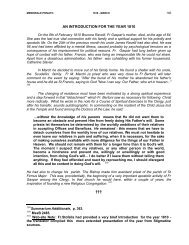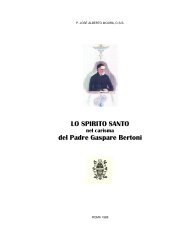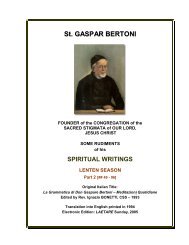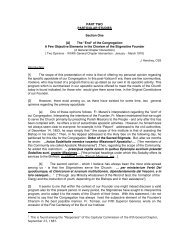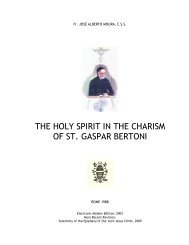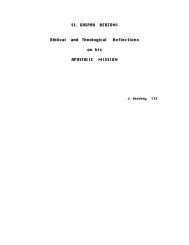Section Four - St. Gaspar Bertoni
Section Four - St. Gaspar Bertoni
Section Four - St. Gaspar Bertoni
Create successful ePaper yourself
Turn your PDF publications into a flip-book with our unique Google optimized e-Paper software.
<strong>Section</strong> <strong>Four</strong><br />
The Divine Indwelling:<br />
The Source and Scope of the Apostolic Mission]<br />
[The English original of an article published in Italian<br />
as: L'inabitazione divina: sorgente e scopo della Missione Apostolica, in:<br />
Compendio di teologia spirituale in onore di Jordan Aumann, OP.<br />
ROMA: PUST 1992, pp. 121-142,<br />
translated into Italian by Fr. Giorgio MARCATO, OP].<br />
Introduction<br />
There is an ascending totality in all Christian spirituality: the Triune God dwells within -<br />
this inspires and enables ecclesial service - which redounds to ever-lasting life with the Father,<br />
Son and Holy Spirit. To realize this, each charism in the Church receives from her and contributes<br />
to her.<br />
In describing his own Dominican charism, Fr. Jordan Aumann in his recent book<br />
Christian Spirituality in the Catholic Tradition, writes:<br />
...because of the central role which the study of sacred truth plays in the Dominican life,<br />
the spirituality of the Friars Preachers is at once a doctrinal spirituality, and an apostolic<br />
spirituality...1.<br />
This has been alluded to in an oft-quoted passage from <strong>St</strong>. Thomas Aquinas, who taught<br />
this principle:<br />
It is better to give to others the fruits of one's contemplation than merely to contemplate...2<br />
The values of contemplata aliis tradere are, of course, not limited to the Dominican<br />
Order. In the Constitution on the Sacred Liturgy, the recent council has taught:<br />
...The Church is essentially both human and divine, visible but endowed with visible<br />
realities, zealous in action and dedicated to contemplation [contemplationi vacantem ],<br />
present in the world, but as a pilgrim, so constituted that in her the human is directed<br />
toward and subordinated to [ ordinetur... subordinetur ] to the divine, the visible to the<br />
invisible, action to contemplation, and this present world to that city yet to come, the<br />
object of our quest...3.<br />
The biblical citation, then, is Heb 13:14, that we do not have here a lasting city, but seek the one<br />
to come.<br />
This emphasis on contemplation is also one of the elements noted by the Dogmatic<br />
Constitution on Divine Revelation for an increase in faith during this earthly pilgrimage:<br />
1 cf. Jordan Aumann, OP, Christian Spirituality in the Catholic Tradition. San Francisco:<br />
Ignatius/Sheed & ward 1986, pp. 129, ff.<br />
2 <strong>St</strong>. Thomas Aquinas, Summa Theologica, II-II, q. 188, a. 6 c.<br />
3 cf. SC # 2.
...The Tradition that comes from the Apostles makes progress in the Church, with the help<br />
of the Holy Spirit. There is a growth in insight into the realities and words that are being<br />
passed on. This comes about in various ways. It comes through the contemplation and<br />
study of believers who ponder these things in their hearts [cf. Lk 2:19, 51]. It comes from<br />
the intimate sense of spiritual realities which they experience. And it comes from the<br />
preaching of those who have received, along with the right of succession in the<br />
episcopate, the sure charism of truth. Thus, as the centuries go by, the Church is always<br />
advancing towards the plenitude of divine truth, until eventually the words of God are<br />
fulfilled in her...4.<br />
This prayerful contemplation, a vital element in increasing the faith in the pilgrim church,<br />
will lead to its commitment to the spreading of the kingdom and to eternal life, described in these<br />
terms by Pope Benedict XII:<br />
...Since the passion and death of the Lord Jesus Christ, these souls have seen and see<br />
the divine essence with an intuitive vision and even face to face ... plainly, clearly and<br />
openly...5.<br />
In the whole life of the Church, the Trinity dwelling within is the primary Agent, as well as<br />
the ultimate Goal: life eternal Every believer is called to contemplate the mystery of God within,<br />
communicate the fruits of this without, and live forever in the same union that has been begun in<br />
time. We will see Him then face to face, even though now we see Him as though in a mirror [cf. 1<br />
Co 13:12] - we will see Him as He is [cf. 1 Jn 3:2]:<br />
... For if we continue to love one another and to join in praising the Most Holy trinity - all of<br />
us who are sons of God and form one family in Christ [cf. Heb 3:6] - we will be faithful to<br />
the deepest vocation of the Church and will share in a foretaste of the liturgy in perfect<br />
glory [cf. SC 8...6.<br />
The Trinity who dwell within is the Source of the Apostolic Mission of the Church, its inner<br />
unifying force as well as its eschatological Hope. Eternal life is the loving praise of the Trinity<br />
offered by the Church in Glory.<br />
THE DIVINE INDWELLING<br />
...Theologians have written much and disputed about the nature of the Indwelling<br />
of the Trinity in the souls of the just. Perhaps none of the theories provides an<br />
adequate explanation; certainly no one of them has been commonly accepted.<br />
But, what is important for our purposes is not so much the formality and mode of<br />
the Indwelling as the fact, its purposes and its consequences...7.<br />
4 cf. DV 8.<br />
5 cf. Pope Benedict XII, Benedictus Deus, January 29, 1336, in: D-S # 530,in: The Christian Faith<br />
in the Doctrinal Documents of the Catholic Church. Revised edition, Edited by J. Neuner, SJ, and<br />
J. Dupuis, SJ. <strong>St</strong>aten Island: Alba 1982, # 2305, pp. 684, ff.<br />
6 LG 51.<br />
7 cf. Jordan Aumann, OP, Spiritual Theology. London: Sheed & ward 1980, pp. 75, ff. cf. also A.<br />
Michel, "Trinite'": Missions Invisibles /Habitation dans les ames", in: Dictionnaire de Tehologie<br />
Cathollique. XV - B. Paris: Letouzey 1950. Col 1841-1855.
The Creation story and a later reflection on it describe humanity as 'made to the image<br />
and likeness of God' [cf. Gn 1:26; Ws 2:23]. With the coming of Jesus Christ, then, this image is<br />
open to becoming a "new self", one that will make progress the more it accepts and cooperates<br />
with renewal in the image of the Creator [cf. Col 3:5, ff.]. This whole process is dynamic, and will<br />
continue to change our lowliness to conform more and more with its own glorified body [cf. Ph<br />
3:21]. The Christian call is to bear the image of the Heavenly man [cf. 1 Co 15:49].<br />
Having been created with a natural capacity for God and a passive ability to be elevated<br />
to a higher life, each human being made to God's image and likeness is called to imitate Him in<br />
His holiness, mercy. The Indwelling of the Most Holy Trinity empowers one to be deeply<br />
immersed in the mission of the Church. Perseverance in this will lead to eternal union with the<br />
Trinity. the divine presence within leads to the life-long commitment to the "total Christ" and to life<br />
everlasting.<br />
John's Gospel offers the underlying principle:<br />
...I pray not only for these but for those also who through their words will believe in me.<br />
may they all be one, Father, may they be one in us, as you are in me and I am in you, so<br />
that the world may believe that it was you who sent me. I have given them the glory you<br />
gave me, that they may be one as we are one. With me in them, and you in me, may they<br />
be completely one, that the world will realize that it was you who sent me, and that I have<br />
loved them as much as you loved me...8<br />
The union of the faithful with the Trinity is modeled on the union of the Divine Persons<br />
within the Trinity, on their mutual Indwelling. this is the source of the ecclesial mission to which<br />
all are called. The first challenge of this is to live God's word, to keep the commandments. For<br />
anyone who does, 'God lives' in that person, and such a faithful believer lives in God [cf. 1 Jn<br />
3:24].<br />
This is seen as a "participation in the divine nature' [cf. 2 P 1:4] - and the Trinitarian<br />
presence within us is a 'personalist' reality:<br />
...Each divine Person communicates Himself and swells in us as in a way proper to Him 9.<br />
...there has been a welcome renewal of the personalist aspect of divine grace, matched<br />
fortunately with a revival of the doctrine of the divine image...10<br />
All activity finds its origin in the Father, the Source of all intra/extra Trinitarian life. In the<br />
created universe, the supreme model of the divine indwelling is the Incarnation:<br />
...Among the external operations of God, the highest of all is the Mystery of the<br />
Incarnation of the Word, in which the splendor of the divine perfections shines forth so<br />
8 cf. Jn 17:20-23.<br />
9 cf. Michael O' Carroll, C.S.Sp., Trinitas. A Theological Encyclopedia of the Holy Trinity.<br />
Wilmington, Del.: Michael Glazier, Inc. 1986, "Indwelling", p.134.<br />
10 cf. Michael O'Carroll, C.S.Sp., Veni Creator Spiritus. A Theological Encyclopedia of the Holy Spirit<br />
Collegeville MN: A Michael Glalzier Book/The Liturgical Press 1990. "The Indwelling of the Holy<br />
Spirit", p. 108. cf. also O'Carroll, "Trinitas", ib., pp. 115, f.: "...Grace is intertwined with the<br />
doctrine of the divine image in man and on the divine indwellling in man..."
ightly that nothing more sublime can even be imagined, nothing else could have been<br />
more salutary to the human race..11.<br />
The redemptive mystery of Christ's Baptism reveals this special presence of the Trinity in<br />
His salvific Mission:<br />
...No sooner had Jesus come up out of the water than he saw the heavens torn apart and<br />
the Spirit, like a dove, descending on him ... And a voice came from heaven: You are my<br />
Son, the Beloved: my favor rests on him... [cf. Mk 1:9, ff.; Lk 3:21, f.].<br />
With the Son's return to the Father at the end of His visible, earthly mission, the Spirit is<br />
sent through him as a gift to all:<br />
...the proof that you are sons is that God has sent the Spirit of his Son into our hearts: the<br />
Spirit that cries: ABBA, Father! [cf. Ga 4:6].<br />
This Indwelling, so much in accord with the personality of the Holy Spirit, is also seen as<br />
some kind of experiential knowledge - at least, the hint is present:<br />
...we know that he lives in us by the Spirit he has given to us... [cf. l Jn 3:24].<br />
,,,we can know that we are living in him and he is living in us because he let us share his<br />
Spirit ... we ourselves have known and out our faith in God's love toward ourselves. God is<br />
love and anyone who lives in love, lives in God and God lives in him...[cf. l Jn 4:13, 16].<br />
In this union in the Holy Spirit, there is needed the "attitude" in the light of Paul' enjoinder:<br />
"put on the mind of Christ Jesus" [cf. Ph 2:5]. Paul motivates the Romans to this "spiritual"<br />
conduct, sharing the filiation of Jesus Christ:<br />
...Your interests, however, are not in the unspiritual, since the Spirit of God has made his<br />
home in you. In fact, unless you possessed the spirit of Christ, you would not belong to<br />
him. Though your body is dead, it is because of sin, but if Christ is in you, then your spirit<br />
is life itself because you have been justified; and if the Spirit of him, who raised Jesus from<br />
the dead is living in you, then he who raised Jesus from the dead will give life to your own<br />
mortal bodies through his Spirit living in you ... if by the Spirit you put an end to the<br />
misdeeds of the body, you will live... [cf. Rm 8:9, ff.]<br />
As perseverance flows from the hope inspired through the gift of the Holy Spirit [cf. Rm<br />
5:5, ff.], each is charged with guarding this treasure:<br />
... you have been trusted to look after something precious; guard it with the help of the<br />
Holy Spirit who lives in us ... [cf. 2 Tm 1:14].<br />
The spirit of filiation shared with Christ in the Holy Spirit eliminates all differences and<br />
unifies the participants in the body of Christ:<br />
...Didn't you realize that you were God's temple, and that the Spirit of God was living<br />
among you? ...The Temple of God is sacred, you are that temple... [cf. 1 Co 3:16, ff.].<br />
11 Pope Leo XIII, Divinum Illud Munus. May 9, 1897, in: The Papal Encyclicals 1878-1903, ed. by<br />
Claudia Caarlen, IHM. Raleigh NC: A Consortium Book, McGrath Publihing Co. 1981, n. 4, p. 411.
... Your body, you know, is the temple of the holy Spirit who is in you, since you received<br />
him from God .. {cf. 1 Co 6:19].<br />
... the temple of God has no common ground with idols, and that is what we are - the<br />
temple of the living God... [cf. 2 Co 6:16].<br />
The "ecclesial" dimension of the divine indwelling has been insisted upon in papal<br />
documents:<br />
...The Church, which already conceived, came forth from the side of the Second Adam in<br />
his sleep on the Cross, first showed herself before the eyes of man on the great day of<br />
Pentecost. On that day, the Holy Ghost began to manifest his gifts in the mystical body of<br />
Christ, by that miraculous out-pouring already foreseen by the Prophet Joel [2:28-29], for<br />
the Paraclete 'sat upon the Apostles as though new spiritual crowns were placed on their<br />
heads in tongues of fire...' (cf. <strong>St</strong>. Cyril of Jerus., Catech. 17)...12.<br />
The intimate association of the faithful believer with the presence of God within is<br />
variously described with a wide use of imagery from the created universe:<br />
- from nature: the example of "living stones" built on the corner-stone risen to new life [cf.<br />
1 P 2:4, ff.];<br />
- from plant life: the vine and the branches [cf. Jn 15], and that fruit can only be produced<br />
in union with Him [cf. 1 Co 15:23, ff.];<br />
- from the example of the one human body and its members [cf. 1 Co 12:12; Ep 2:15; Col<br />
1:18];<br />
- finally, the union of matrimony [cf. Ep 5:21, f.]. The "jealous" God yearns for totality:<br />
...But anyone who is joined to the Lord is one spirit with him... [cf. 1 Co 6:17].<br />
...Surely you don't think scripture is wrong when it says: the Spirit which he sent to live in<br />
us wants us for himself alone... [cf. Jm 4:5]<br />
The term "Indwelling" indicates the permanency of the Lord's presence:<br />
... If anyone loves me, he will keep my word and my Father will love him and we shall<br />
come to him and make our hoe with him... [cf. Jn 14:13].<br />
The divine presence within the Church and its members is the assurance for the charism<br />
of truth entrusted to the Church, and the spring-board of her apostolic mission:<br />
... the Advocate, the Holy Spirit, whom the Father will send in my name, will teach you<br />
everything and remind you of all I have said to you... [cf. Jn 14:26].<br />
Pope Leo XII Iput it this way:<br />
...Then the Apostles descended from the mountain, as <strong>St</strong>. John Chrysostom writes, 'not<br />
bearing in their hands tables of stone like Moses, but carrying the Spirit in their mind, and<br />
pouring forth the treasure and the fountain of doctrines and graces [In Mt., Hom. I, 2 Co<br />
3:3]... This truth he communicates to his Church, guarding her by his all powerful help<br />
from ever falling into error, and aiding her to foster daily more and more the germ of divine<br />
doctrine and to make them more fruitful for all people...13.<br />
12 cf. Pope Leo XIII, Divinum Illud Munus. n. 5, p. 412. cf. also Vatican II, LG 3; SC 5<br />
13 Pope Leo XIII, ib.
Pope John Paul II echoes these sentiments, adding the dimension of the Risen Christ:<br />
...the Second Vatican Council speaks of the Church's birth on the day of Pentecost. this<br />
event is the definitive manifestation of what had already been accomplished in the same<br />
Upper Room on Easter Sunday. The Risen Christ 'brought' to the Apostles the Holy<br />
Spirit...14.<br />
This :"guarding the treasure" is what is then handed on, as implementation of Christ's<br />
own mission received from the Father, communicated to the Apostles in the Holy Spirit:<br />
...Peace be with you! When he had said this, he showed them his hands and his side...<br />
Peace be with you. As the Father has sent me, so, I send you. And when he said this, he<br />
breathed on them and said to them: Receive the Holy Spirit... [cf. Jn 20:19, ff.].<br />
The "fact" of the Divine Indwelling is accepted as a "special treasure" of the Church. Its<br />
manner will be open for discussion - in some way, it is a share in the very nature of the divine<br />
persons and in their relationship within the Trinity:<br />
...It must be borne in mind that there is a question here for a hidden mystery, which<br />
during this earthly exile can be simply seen through a veil, and which no human words can<br />
express. The Divine Persons are said to indwell inasmuch as they are present to beings<br />
endowed with intelligence in a way that lies beyond human comprehension, and in a<br />
unique and very intimate manner, which transcends all created nature, these creatures<br />
enter into a relationship with them through knowledge and love...15.<br />
Fr. Aumann describes the terms of this mystery:<br />
...we are one with God by the formal and physical participation of his divine nature, which<br />
participation is nothing other than sanctifying grace...16.<br />
Pope John Paul II presents the mystery in these terms:<br />
...Under the influence of the Holy Spirit, this inner 'spiritual' man matures and grows<br />
strong. thanks to the divine Self-communication, the human spirit which 'knows the secrets<br />
of man' meets the Spirit who searches everything, even the depths of God.' In this Spirit,<br />
who is the eternal Gift, the triune God opens himself to man, to the human spirit...17.<br />
This is the most sublime perfection of a human being and each is called to increase this<br />
likeness:<br />
...Man's intimate relationship with God in the Holy Spirit also enables him to understand<br />
himself, his own humanity, in a new way. Thus, that unique image and likeness of God<br />
which man is from his very beginning is fully realized...18.<br />
14 Pope John Paul II, Encyclical Letter, Dominum et Vivificantem. May 18, 1986, n. 25.<br />
15 Pope Pius XII, Mystici Corporis Chriti, June 29, 1943, in: The Papal Encyclicals 1939-1958. ed.<br />
by Claudia Carlen, IHM.RaleigH NC. A Consortium BOok. McGrtah Publishing Co., 1981, p. 53.<br />
16 J. Aumann, Spiritual Theology. p. 77.<br />
17 cf. Pope John Paul II, Dominicum et Vivificantem, # 58.<br />
18 ib., # 59.
MISSIONARY CONTEMPLATION<br />
This supreme gift of God asks for cooperation, a response on the part of the recipient.<br />
The mystery of the Triune God within enables one to "treasure" in the heart [cf. Lk 2:19, 51],<br />
developing an experiential knowledge of the presence of the Most High. Each recipient is<br />
capacitated, empowered to dynamic progress, leading to a healing transformation. The mutual<br />
inherence results in an identification of what is willed in the Divine Plan.<br />
There is in this the cooperation of understanding and loving:<br />
... In this Divine Indwelling, the most Holy Trinity is really and substantially present in the<br />
souls of the just by reason of sanctifying grace: not precisely in so far as it is an effect of<br />
God, but by reason of the operations [or habits] of love and knowledge, of which grace is<br />
the root...19.<br />
In the traditional Thomistic view, grace elevates the soul, and faith infused the mind,<br />
while hope and charity infuse the will. Charity inspires the frequent thought about God, by uniting<br />
to Him. This frequent, loving through leads to a sense of joy in coming to grasp more and more<br />
just in knowing the goodness of God. From a simple thought in the mind, under the impulse of<br />
charity, one is led toward God, to pondering the profound secrets of His loving Being and Plan.<br />
This penetrating knowledge becomes intimate contact, and all reinforce union with God 20.<br />
As in <strong>St</strong>. Paul's "obedience of faith" [cf. Rm 16:26; 2 Co 10:5, f., as quoted by DV 5],<br />
there is an intimate cooperation with the grace of God in the exercise of the theological life. this<br />
"contemplation" develops under the impulse of charity, with the scope of intensifying fervor, and<br />
strengthening union. Such mental reflection, without love, could be mere theoretical and<br />
speculative thought, but not prayer, or meditation. It is not so much that emphasis is given to the<br />
discovery of the "new", or the novel, as it is to grasp better the mysteries of God and His Plan.<br />
The wisdom and goodness of God are already known and experienced 21.<br />
In the earlier levels of this loving contemplation, it is not enough simply to call to mind<br />
some thought about God, but there is motivated a deeper reflection, to make some judgment on<br />
this, to bring the matter of faith to the most clear insight possible. When this contemplation is<br />
"infused", there is a greater insertion into this mystery. This is the realm of the Gifts of the Holy<br />
Spirit that come to supply for the deficiency before the Almighty, and to heal wounded nature.<br />
There is given a new ability, the mind and heart are raised to a new height, gifted with a more<br />
precise knowledge of God and His plan 22.<br />
It is through wisdom that the believer comes to learn more sublimely and more intensely<br />
about God, and His will. As wisdom works in harmony with the active exercise of charity - which,<br />
in turn, realizes union with the loving God 23 . While wisdom does flow fro charity as from its<br />
19 Francis L. B. Cunningham, OP, The Indwelling of the Trinity. Dubuque: The Priory Press 1955,<br />
pp. 191, ff.<br />
20 cf. H. D. Gardeil, OP - H.D. Noble, OP, Saint Thomas d' Aquin. Somme Theologique. La Charite'.<br />
[Fr. tr. - Gardeil; notes and appendices, Noble]. Tome II, II-II, qq. 27-33. PAris: Descelee 1967, p.<br />
379, n. 4.<br />
21 cf. Gardeil-Noble, ib., pp. 381, ff.<br />
22 cf. ib., pp. 382, ff.<br />
23 cf. ib., pp. 384, ff.
source, it is still an exercise of knowledge. Its act is to contemplate the divine realities that are<br />
loved, and beginning with these, it makes its judgment on all else 24.<br />
These views lead to this succinct description:<br />
...A quasi experimental knowledge, springing from the love and knowledge rooted in<br />
grace, is the proximate formal reason for the divine indwelling...25.<br />
This loving knowledge, rooted in grace, attains the Divine Persons as present. It is<br />
something like sense experience, involving a sympathy for the object and an affinity for It: in this<br />
case, God and His Plan 26. The effects of grace are experienced and tasted, by a sort of<br />
contact, that goes beyond speculation and abstraction 27.<br />
In all of this, the concepts that come from faith are the medium by which the content of<br />
revelation is contemplated and studied. Charity, however, orders one so engaged more radically<br />
to the inner secrets of God. By a kind of intuition, there intensifies a truly spiritual, experiential<br />
knowledge of "the things of God." The simple state of grace is already moved toward a<br />
relationship with the presence of God within 28.<br />
In this sublime union, God enters into an objective, real and intimate contact with the<br />
believer. Known in the obscurity of faith, this is elevated by an intimate experience of loving<br />
understanding. So, it is not simply the knowledge of God, but one that is elevated by the exercise<br />
of the Gift of Wisdom, that is moved by charity. This effects a certain union and "connaturality". It<br />
is not only learning, but, in a certain sense, enduring, suffering the divinity. However, the<br />
experimental knowledge of God is not reserved for eternity, but begin on earth in the pilgrimage<br />
toward the heavenly home 29.<br />
As is commonly said, grace is a "life", that begins here, is "changed" in death, but not<br />
ended. It is shared with the risen Christ, like flowing from the main stock, or like placing stones as<br />
near as possible to the living, life-giving Corner stone:<br />
...Out of his infinite glory, may he give you the power through his Spirit for your hidden self<br />
to grow strong, so that Christ may live in your hearts through faith and then, planted in<br />
love and built in love, you will, with all the saints, have the strength to grasp the breadth<br />
and the length, the height and the depth, until knowing the love of Christ, which is beyond<br />
all knowledge, you are filled with the utter fullness of god... [cf. Ep 3:14, ff.].<br />
The Church is called to advance always toward the plenitude of divine truth until<br />
eventually the words of god are fulfilled [cf. DV 8]:<br />
24 cf. H. D. GArdeil, OP - V. VErgriete, OP, Saint Thomas d'Aquin. Somme Theologique. La<br />
Charaite'. Tome III, II-II, qq. 34-36. Paris: Desclee 1963, p. 406.<br />
25 cf. Cunningham, The Divine Indwelling. p. 196.<br />
26 cf. ib., p. 198.<br />
27 cf. ib., p. 201.<br />
28 cf. H. F. Dondaine, OP, <strong>St</strong>. Thomas d'Aquin. Somme Theologique. La Trinite'. I, qq. 33-43.<br />
Paris: Descelee 1962, p. 448.<br />
29 cf. Gardeil - Vergriete, La Charite'. Tome III, pp. 407, ff.
...for Christian spiritual life consists in being led into the sphere of the Trinity, in becoming<br />
a son of the Father, a brother of Christ, and a temple of the Holy Spirit...30.<br />
This is the heart of prayer, to discover the splendor of the Trinity, the archeteype of all<br />
beauty and love - the Divine Three constantly beckoning for an exchange of love 31. The<br />
"oneness" to which the Church and all are called is a communion with the Three, an eternal<br />
exchange of love. The fullness of personal existence coincides with the fullness of the exchange<br />
of gifts 32.<br />
This is a call to "New Life" in Christ Jesus:<br />
...the Good News that Jesus came to give us is that the Kingdom of God is truly within us.<br />
It is the inner, hidden, dwelling presence of the Holy Spirit, given to us in Baptism in an<br />
embryonic relationship whereby through the inner operations of the Spirit upon us in faith,<br />
hope and love, we become more and more aware that we live a new life in Christ<br />
Jesus...33.<br />
With the central image of the Trinity being one of knowing and loving relationships, this<br />
dynamism is infused into each one participating in the divine nature [cf. 2 P 1:4].<br />
The Divine Persons, in an eternal exchange of knowledge and love, come to dwell within<br />
the human person, in a new and special way. They "come" not only to give life, but also to<br />
establish something like an experimental union. there is a kind of "seal" that communicates the<br />
special virtue of the Divine persons, and each recipient is orientated toward the eternal enjoyment<br />
of what has been begun. A personal energy is communicated to the faithful. This divine action is<br />
variously described as a divine "touch", inspiring a reaction of loving contemplation and<br />
commitment to the things of God 34.<br />
There is initiated a tension toward ever deeper union, which shows the supremacy of<br />
charity over faith and hope: these latter place one in relationship with God directly, whereas<br />
charity, inspiring loving contemplation, achieves a living union meant to develop. In loving<br />
contemplation, distance from God is progressively overcome, in so far as this is possible to a<br />
creature. All will be perfected in response to the effort under grace. The faithful believer comes to<br />
hand over all of one's being to the Most High, in an abandonment to the Divine Will. There is a<br />
compenetration of God's Will into that of human beings 35.<br />
This intimate "friendship" with God brings with it a unifying power with loving<br />
contemplation, one's thought penetrate more and more into the reality of God and His interests.<br />
This interior union, accompanied by interior joy, intensifies the unification of the Will of God.<br />
Gradually, an ever deeper perception is achieved 36.<br />
30 Jean Danielou, SJ, God's Life in Us. Denville NJ: Dimension Books Inc. 1969, p. 43.<br />
31 cf. ib., p. 32.<br />
32 cf. ib., pp. 48, ff.<br />
33 cf. George Maloney, SJ, Invaded by God. Mysticism and the Indwelling Trinity. London": Sheed<br />
& Ward 1980, pp. 155, ff.<br />
34 cf. Dondaine, La Trinite'. Tome II, p. 450.<br />
35 cf. Gardeil-Noble, La Charite'. Tome II, p. 375.<br />
36 cf. ib., p. 391.
From his earliest writings, <strong>St</strong>. Thomas considered the divine indwelling as the presence<br />
of God operating within the faithful believer. This presence of God is within His chose, and this<br />
"choice" is offered to each and every one. Grace inspires an authentic dynamism within anyone<br />
properly open to this life of union and its challenges. This "new" divine presence reaches the<br />
creature in the totality of his/her human being 37.<br />
In order to achieve this in its totality, there is necessary life-long conversion,<br />
transformation. The life of grace that is allowed to flourish within, by being cooperated with<br />
constantly works to achieve this elevation of each person to an ever more intense union. This<br />
grace is a share in the very being of God, and is in accord with the innate capacity and<br />
developing disposition of the recipient. It remains a special and positive good within each one 38.<br />
With charity, its place in the life within is that of deepening the relationship with the Trinity<br />
through gradual purification, and contributing to loving contemplation. A mutual development<br />
takes place between mind and heart, intellect and will: the knowledge of God becomes more and<br />
more both the object and motive for charity. Through the joy that results, the yearning for eternity<br />
develops. he authentic "gnosis" of God is also the "theory" of God, knowledge becomes<br />
contemplation 39. The "wounds" of mind and will, of the soul, are healed - and what is healed is<br />
elevated 40 .<br />
The great challenge for the committed believer is to learn the will of God, and then do it.<br />
The Trinity dwelling within adapts divine knowledge and love for the to be operative, productive<br />
in the life of the creature 41, With all the difficulties that accompany the Thomistic view, it appears<br />
quite clear that the divine operative presence within leads to ever more intense union of wills, "on<br />
earth as it is in heaven'. this unifying charity is intensified also by loving contemplation that is then<br />
communicated, shared with others. Along with a sublime benevolence, love is also communion,<br />
identification in as much as this is possible in the lives of those who love one another. Here we<br />
touch the very mystery of divine love, which is an on-going, intensifying experience, adherence<br />
and inherence between the divine and human 42.<br />
Love serves as the font for all this activity of contemplating also for the benefit of others.<br />
This leads to an eternal elevation and continuation of what has been begun. This love helps to<br />
bring into clearer focus a superior level of knowledge and affectivity. Love, in some way, brings<br />
the beloved within the lover. This is achieved through an intimate bond between mind and heart.<br />
The beloved adheres more and more to the person loving, by a mutual interiorization 43.<br />
Identification of wills is the hoped-for goal, imperfect for as long as life lasts, and relatively<br />
perfected for eternity. This reciprocal harmony in love leads to the unification of wills in the divine<br />
plan 44.<br />
37 cf. Dondaine, La Trinite'. Tome II, pp. 442, ff.<br />
38 cf. r. Mullrd, OP, Saint Thomas d'Aquin. Somme Theologique. La Gracde. I-II, qq. 109-114. [Fr.<br />
tr]. PAris: Descelee 1948, 2nd ed., pp. 307, ff.<br />
39 Charite' : La Place de la charite' dans la vie spirituelle. Rapports avec la purification et avec la<br />
contemplation. in: Dictionnaire de la Spiritualite'. Paris; Beauchesne. Col. 551-558, passim.<br />
40 cf. Mulard, La Grace, p. 314.<br />
41 cf. Dondaine, La Trinite', Tome II, pp. 439, ff.<br />
42 cf. Gardeil - Noble,, La Charite'. Tome II, pp. 363, f.; cf. also Note 8, pp. 227, f.<br />
43 ib., pp. 367, ff.<br />
44 ib., p. 371.
Abandoning oneself to the divine plan, union is achieved by committing one's entire self<br />
to the divine word [cf. DV 5]. This requires the intention of conformity and at least an implicit and<br />
virtual submission to the divine will as the initial unification of mind and heart with God. While<br />
human life has its daily requirements, tedious tasks and urgent demands that tend to "fragment"<br />
one, loving contemplation is a way to unify, harmonize one' commitment 45.<br />
A CONTEMPLATIVE MISSION<br />
...What we have seen and heard, we are telling you so that you, too, may be in union with<br />
us, as we are in unin with the Father and with the Son, jesus Christ... [cf. 1 Jn 1:3].<br />
True witness presupposes some knowledge of the event, and basic truthfulness. each of<br />
the baptized is called to this, to further the mission as described by Pope John Paul II:<br />
... Along the path of an inner maturity, which includes the full discovery of the meaning of<br />
humanity - God comes close to man, and permeates more and more completely the whole<br />
human world. The Triune God, Who 'exists' in himself as a transcendent reality of interpersonal<br />
gift, giving himself in the Holy Spirit as gift to man, transforms the human world<br />
from within, from inside hearts and minds...46.<br />
All mission in the Church is a cooperation with the prolongation in time of the eternal<br />
generation and procession within the Trinity:<br />
... The Mission of the Spirit at Pentecost was thus described in a promise: 'But the<br />
Counsellor, the Holy Spirit, whom the father will send in my name, he will teach you all<br />
things and bring to your remembrance all that I have said to you... [cf. Jn 14:26; cf. Lk<br />
24:29; Ac 1:4-5...47.<br />
Even with ordinary talent, union with God enables one to respond in an extraordinary<br />
manner. Within every human person there is a capacity that remains latent, but responds to the<br />
touch of the Primary Agent, the Ultimate Cause. This "obediential power of submission" in the<br />
hands of God can accomplish wonders for the Kingdom 48.<br />
There is indeed a definite ecclesiality in the Apostolic Mission, already noted in the image<br />
of the Indwelling:<br />
... Vatican Council II makes a special point of the fact that among the various biblical<br />
images of the Church [sheepfold of Christ, tract of land to be cultivated, a choice vineyard,<br />
a beloved bride, temple of the Spirit], the last is most commonly used...49.<br />
The ecclesial mission is begun with baptism, where the divine presence is<br />
communicated, inaugurated 50. The consequence of the extension of the internal and external<br />
45 ib., pp. 388, f.<br />
46 cf. Pope John Paul II Dominum et Vivificantem, n. 59.<br />
47 cf. O'Carroll, Veni Creator Spiritus, p. 12.<br />
48 cf. Mullard, La Grace. p.327.<br />
49 cf. Thomas Dubay, SM, God Within Us. Denville NJ: Dimension Books 1971, pp. 85, f.<br />
50 cf. Dondaine, La Trinite'., Tome II, pp. 449, ff.. cf. also Dubay, o.c., p. 115: "... as a<br />
consequence of the close relationship between this new creation and the divine abiding of the
missions within the Trinity is an intimate, holy beatifying union of the believer with the divine<br />
Persons. The Mission of the Divine Son brought an entirely new aspect of God, Father, and Holy<br />
Spirit. This Mission comes throughout history as the continuation of the eternal missions within<br />
the trinity and as a promise of eternal union 51:<br />
...When Vatican II set out to explain the missionary activity of the Church, it begins with<br />
the inter Trinitarian life. After noting that the pilgrim eccklesia is missionary by nature,<br />
the Council continues ... [AG 2]... not only is the Triune Lord the origin of the ecclesial<br />
mission, he is the primordial cause of fecundity...52.<br />
There are diverse tendencies of the love of God: one is a real taste, hunger and thirst for<br />
contemplation, leading to a more committed love for one's neighbor, along with a certain<br />
happiness with the order of the universe - so severely under attack in our own time. Through<br />
loving contemplation, the believer is pushed to exterior action in behalf of others, and also for the<br />
preservation of the planet earth. While there develops a most confident sense of abandonment to<br />
Divine Providence, there is instilled an attitude of biblical hope, with zeal for the divine glory 53.<br />
Union with God, and the almost experimental knowledge of the Trinity, brings with it a special<br />
sense of the relationship with the Divine persons who are sent 54.<br />
Friendship with God is essentially the aspiration of achieving harmony, unity. This<br />
affectionate reflection on the Trinity transforms the quality of the prayer within the Church.<br />
Abandonment to the divine will increases hand in hand with hope-filled zeal 55.<br />
CONCLUSION<br />
...The transfiguration of the temple is modeled after the very pattern of the Risen Kyrios.<br />
The risen Lord remains the corner-stone of the spiritual house... Jesus will transfigure<br />
these wretched bodies of ours into copies of hi glorious body... [cf. Ph 3:21]. 56.<br />
This is simply the fulfillment of the hope that is enunciated to the Romans and to all:<br />
... These sufferings bring patience, as we know, and patience brings perseverance, and<br />
perseverance brings hope, and this hope is not deceptive because the love of God has<br />
been poured into our hearts by the Holy Spirit which has been given to us... [cf. Rm 5:4,<br />
ff.].<br />
...Though your body is dead it is because of sin, but if Christ is in you, then your spirit is<br />
life itself because you have been justified; and if the spirit of him who raised Jesus from<br />
tree dead will give life to your own mortal bodies through his spirit living in you... And if we<br />
Trinity, it follows that as one growing race, he likewise grows in his capacity to know, love, enjoy<br />
the Father, Son and Spirit..."<br />
51 cf. Alexis Benigar, OFM, Theologia Spiritualis. Roma: Secretaria Missionum OFM 1964, pp. 112-<br />
119, passim.<br />
52 cf. Dubay, God within Us. p.146; cf. also p. 115.<br />
53 cf. Guy de Broglie, SJ, Charite'. VIII. Essai d'une synthese doctrinale. C. Tendance de l'amour<br />
de Dieu, in: Dictionnaire de Spiritualite' Pars: Beauchesne Col. 668, ff.<br />
54 cf. Gardeil- Vergriete, La Charite'. Tome III, p. 409.<br />
55 cf. Guy de Broglie, ib., Col. 617.<br />
56 cf. Dubay, God Within Us, p. 215.
are children, we are heirs as well, heirs of God and co-heirs with Christ, sharing his<br />
suffering, so as to share his glory... [cf. Rm 8:9, ff.].<br />
Grace "divinizes" human beings, ordaining the mind and heart through the theological life<br />
toward the eternal, loving contemplation of God 57. Charity tends to unite one to God and will lead<br />
to the eternal vision and loving contemplation of the inner-most secrets of God .58 There is no<br />
such reality as a "static" image of God - the human being is "naturally capable of God", and Jesus<br />
Christ in some way, is united to every one [cf. GS 22]. The infusion of charity is a kind of<br />
communication of beatitude 59.<br />
Pope Leo XII offers this rich insight:<br />
...God, by grace, resides in the just soul as in a temple, in a most intimate and peculiar<br />
manner. From this proceeds that union of affection by which the soul adheres most closely<br />
to God, more so than the friend is united to his most loving and beloved friend, and enjoys<br />
God in all fullness and sweetness. Now this wonderful union, which is properly called<br />
'indwelling', differing only in degree or state from that which God beatifies the saints in<br />
heaven, although it is most certainly produced by the presence of the whole Blessed<br />
Trinity: 'We will come to them and make our abode with them' [Jn 14:23] - nevertheless, it<br />
is attributed in a particular manner to the Holy Spirit.... By means of the seven Gifts the<br />
soul is excited and encouraged to seek after the evangelical beatitudes, which like flowers<br />
that come forth in the spring time, are the signs and harbingers of eternal beatitude...60.<br />
In eternity,, the loving contemplation of the three Persons will be "perfected":<br />
...<strong>St</strong>. Thomas calls grace 'the beginning of glory', and <strong>St</strong>. Irenaeus designates it as 'the<br />
seed of the Father'. Therefore, when we speak of perfection, or sanctification as a<br />
proximate goal of the spiritual life, we are referring not to any specific degree of perfection<br />
at a given moment, but to the ideal placed before all Christians by Christ Himself: 'you<br />
shall love the Lord your God with all your heart, and with all your soul, and with all your<br />
mind and with all your strength' [Mk 12:30]. This is the goal of the spiritual life received<br />
through Christ by the power of the Holy Spirit...61.<br />
+<br />
+++<br />
+<br />
The End<br />
57 cf. Dondaine, La Trinite', Tome II, p. 447.<br />
58 cf. GArdeil-Noble, La Charite'. Tome II, p. 379.<br />
59 cf. L.B. Gillon, OP, " Charite'", Les grands scoles: Dominicain", in: Dictionnaire de Spiritualite.<br />
Paris: Beauchesne Col. 581.<br />
60 cf. Pope Leo XIII, Divinum Illud Munus, n. 9, p. 414.<br />
61 cf. Jordan Aumann, Spiritual Theology, p. 47 - the Conclusion to Part I, c. 2: "The Goal of our <strong>St</strong>riving."



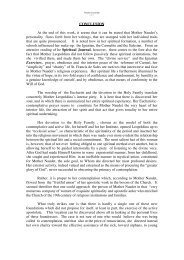

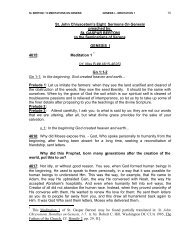
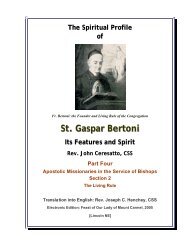
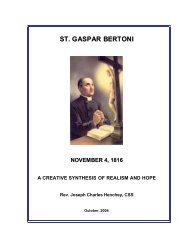
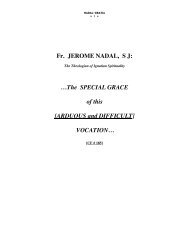
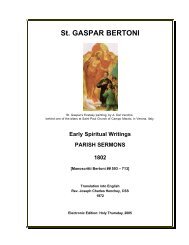
![[B.] St. IGNATIUS of LOYOLA Presentation: The ... - St. Gaspar Bertoni](https://img.yumpu.com/33393889/1/190x245/b-st-ignatius-of-loyola-presentation-the-st-gaspar-bertoni.jpg?quality=85)
